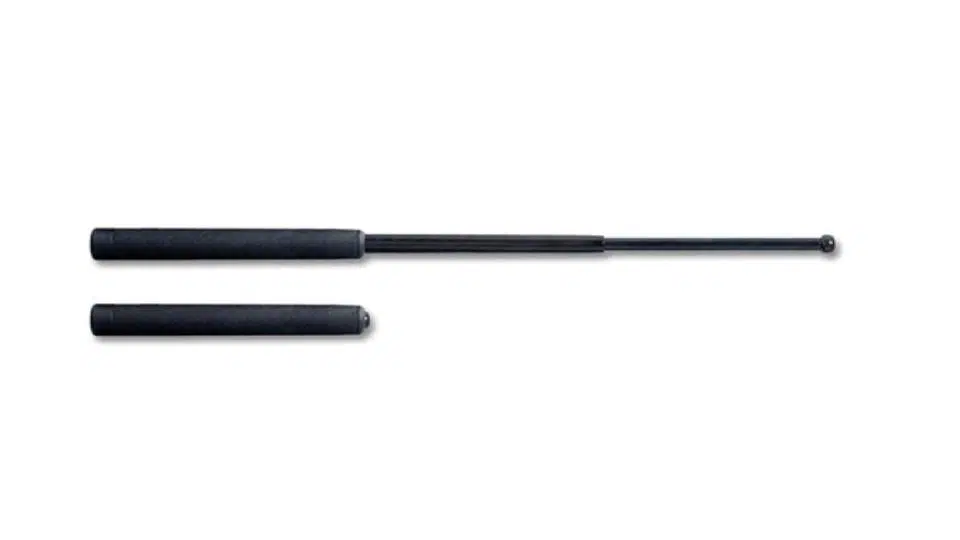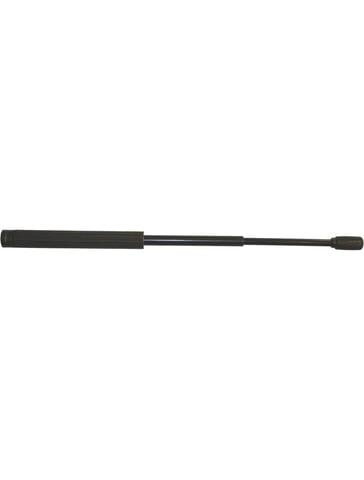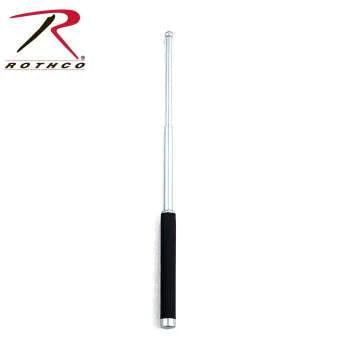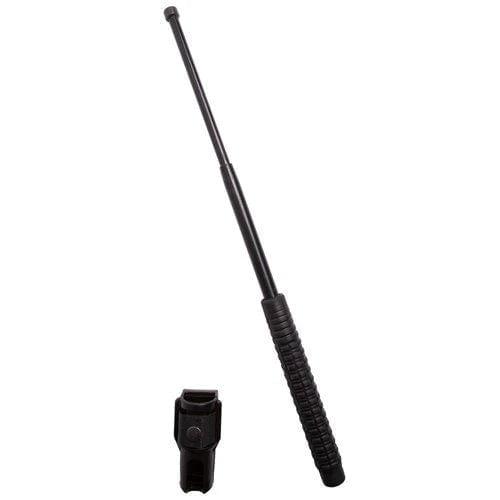Expandable batons, also known as telescoping or collapsible batons, enjoy legal status for civilian possession across various states in the United States as of 2024. These self-defense tools are designed to extend and retract, offering flexibility and ease of carry while ensuring effective personal protection. However, the legality and specific regulations governing expandable batons can vary significantly from state to state.
In most jurisdictions, owning an expandable baton typically does not necessitate a permit or license for personal use, as they are classified as non-lethal defensive instruments when used responsibly. Nevertheless, it’s crucial to familiarize oneself with local laws, as some states impose age restrictions, training prerequisites, or specific circumstances under which these batons can be carried legally.
Legally, expandable batons are often categorized as “less lethal” weapons, distinct from firearms and subject to different regulatory frameworks. State statutes outline permissible uses and conditions under which individuals can possess and utilize these tools. Case law and judicial interpretations further contribute to defining the boundaries of lawful use in self-defense scenarios.
For individuals seeking clarity on the legality of expandable batons, consulting local law enforcement agencies or legal professionals is advisable. These authorities can provide guidance tailored to specific state laws, ensuring compliance with regulations while maximizing personal safety measures.
In summary, while expandable batons are generally legal for civilian possession in many states across the U.S. in 2024, navigating local statutes and staying informed about any updates is essential. By understanding legal frameworks and seeking expert advice, individuals can responsibly integrate expandable batons into their personal safety strategies within the bounds of the law.
Collapsible Baton Laws By State
To Understand this we have not only provided you the table of states that are allowing following types of batons but also specific answers have been written below this table to remove any confusion left.
| State Name | Open Carry | Concealed Carry | Other Permit | Comments |
| Alabama | Legal | Legal | N/A | Standard open and concealed carry permitted. |
| Alaska | Legal | Legal (21+ years old) | N/A | Age restriction applies to concealed carry. |
| Arizona | Legal | Legal (21+ years old) | N/A | Concealed carry restricted to those 21 and older. |
| Arkansas | Vague | Vague | Yes | Carry legality is ambiguous, especially “with a purpose to employ as a weapon against a person”. |
| California | Illegal | Illegal | Yes | Baton possession and carry are prohibited. |
| Colorado | Legal | Legal | N/A | Both open and concealed carry are allowed. |
| Connecticut | Illegal | Illegal | No | Baton carry is restricted, except for on-duty security personnel. |
| Delaware | Legal | Illegal | Yes | Open carry is permitted, but concealed carry is not. |
| District of Columbia | Legal | Vague | No | Concealed carry laws are unclear; general hostility towards weapon carry observed. |
| Florida | Legal | Illegal | Yes | Open carry is permissible, but concealed carry is not. |
| Georgia | Legal | Legal | N/A | Both forms of carry are allowed without restrictions. |
| Hawaii | Illegal | Illegal | No | Batons are prohibited, with specific exceptions like fish bats. |
| Idaho | Legal | Vague | Yes | Concealed carry laws are ambiguous, especially outside city limits. |
| Illinois | Vague | Vague | ? | Laws are unclear, especially regarding intent and government buildings. |
| Indiana | Legal | Legal | N/A | Standard open and concealed carry allowed. |
| Iowa | Legal | Vague | Yes | Concealed carry laws are broad and can be applied to any “dangerous weapon”. |
| Kansas | Legal | Illegal | No | Concealing a “billy” is not allowed. |
| Kentucky | Legal | Illegal | Yes | Open carry is permissible, but concealing is not. |
| Louisiana | Legal | Vague | No | Concealed carry laws are ambiguous, especially regarding “dangerous weapons”. |
| Maine | Legal | Vague | No | Concealed carry laws are not explicit. |
| Maryland | Legal | Vague | Yes | Laws are unclear but have a self-defense provision. |
| Massachusetts | Legal | Legal | N/A | Restrictions apply during certain situations like breaches of peace. |
| Michigan | Vague | Vague | No | Carry laws are ambiguous, especially regarding intent. |
| Minnesota | Vague | Vague | No | Possession laws are broad and can be applied to any weapon used unlawfully against another. |
| Mississippi | Legal | Legal | N/A | Both forms of carry are allowed without restrictions. |
| Missouri | Legal | Vague | Yes | Concealed carry laws are ambiguous, especially for weapons “capable of lethal use”. |
| Montana | Legal | Illegal | Yes | Open carry is permissible, but concealing is not. |
| Nebraska | Legal | Vague | No | Concealed carry laws are ambiguous, but the burden of proof lies with the state. |
| Nevada | Illegal | Illegal | Yes | Baton possession and carry are prohibited, but exceptions exist with county sheriff permission. |
| New Hampshire | Legal | Legal | N/A | Both forms of carry are allowed without restrictions. |
| New Jersey | Illegal | Illegal | Yes | Baton possession and carry are prohibited, with exceptions for trained guards. |
| New Mexico | Vague | Vague | Yes | Carry laws are ambiguous, especially for “deadly weapons”. |
| New York | Illegal | Illegal | No | Baton possession and carry are prohibited. |
| North Carolina | Legal | Vague | No | Concealed carry laws are not explicit. |
| North Dakota | Legal | Illegal | Yes | Open carry is permissible, but concealing is not. |
| Ohio | Legal | Vague | No | Concealed carry laws are ambiguous. |
| Oklahoma | Illegal | Illegal | No | Baton possession and carry are prohibited. |
| Oregon | Legal | Legal | N/A | Both forms of carry are allowed without restrictions. |
| Pennsylvania | Vague | Vague | No | Laws are unclear, especially regarding “common lawful purpose”. |
| Rhode Island | Illegal | Illegal | No | Baton possession and carry are prohibited with no exceptions noted. |
| South Carolina | Legal | Vague | No | Concealed carry laws are ambiguous, especially for weapons causing “personal injury”. |
| South Dakota | Legal | Legal | N/A | Both forms of carry are allowed without restrictions. |
| Tennessee | Illegal | Illegal | Yes | Baton possession and carry are prohibited. |
| Texas | Legal | Legal | N/A | Both forms of carry are allowed without restrictions. |
| Utah | Legal | Legal | N/A | Both forms of carry are allowed without restrictions. |
| Vermont | Legal | Legal | N/A | Both forms of carry are allowed without restrictions. |
| Virginia | Legal | Vague | No | Concealed carry laws are ambiguous, especially for “dangerous weapons”. |
| Washington | Illegal | Illegal | No | Baton possession and carry are prohibited. |
| West Virginia | Legal | Vague | No | Concealed carry laws are not explicit. |
| Wisconsin | Legal | Vague | No | Concealed carry laws are ambiguous, especially for “dangerous weapons”. |
| Wyoming | Legal | Vague | No | Concealed carry laws are not explicit. |
Are batons legal in Texas?
Batons are generally legal in Texas. However, there are a few restrictions. Extendable batons and other prohibited types of batons must be carried in a holster or sheath that is fastened to the person.
Are collapsible batons legal in California?
Without a permit, Californians cannot own, sell, manufacture, or distribute collapsible batons.
Are collapsible batons legal in Michigan?
The state of Michigan forbids the use of collapsible batons. In the state of Michigan, it is forbidden to carry or own anything that could be used as a weapon, either offensively or defensively.
Are batons legal in Massachusetts?
In Massachusetts, you are not breaking the law if you don’t conceal or cover up the fact that you are carrying a baton.
Are collapsible batons legal in pa?
In Pennsylvania, it is against the law to own or carry a foldable baton. Due to its intended function of hitting or jabbing a person to immobilize or subdue them, a collapsible baton is a form of weapon that is illegal to own, possess, or carry.
Are batons legal in Florida?
Without a valid permit, it is prohibited to carry a baton or other bludgeon in the state of Florida.
Are batons legal in Maryland?
The use of a baton is permissible in Maryland, but only if done so within the law. Intentional baton possession or usage is against the law.
Are batons legal in NY?
No, collapsible batons are illegal. In New York, it is against the law to use, own, or sell a baton.
Are collapsible batons legal in Missouri?
The legality of collapsible batons in Missouri is at best ambiguous. Despite the fact that there is no specific law prohibiting the transfer of firearms, several types of weapons are illegal according to state law. So, before purchasing a firearm, consult a local police officer or attorney.
Are expandable batons legal in Georgia?
No, expandable batons are illegal in Georgia.
How to use Expandable Batons?
Enroll in accredited self-defense training with a reputable instructor to understand the strategies and safety precautions required for using a baton for self-defense. When using a baton as self-defense, keep the following in mind:
Perfect your grip and stance: Maintain control of the baton while standing with your feet about shoulder-width apart and your knees slightly bent.
Focus on the crucial areas: The most serious injuries from a baton blow are to the head, neck, and joints. However, keep in mind that you should only use as much force as is required to deal with the current circumstance.
Employing your body weight: Use your body weight as a weapon to produce power and force in your baton swings.
Keep your eyes and ears open: Always be aware of where you are and be prepared to defend yourself. Try to negotiate your way out of tricky circumstances whenever you can, and use physical force as a last resort.
A police baton expandable for self-defense or other weapon should only be used for self-defense if there is no other way to stop serious injury or death. This is a serious problem. Never try to use a weapon you are not adequately trained to wield, as this puts your safety at risk.
How to close an expandable baton self-defense tool?
The steps for shutting an Expandable stick self-defense are as follows:
- For stability, keep one hand on the baton’s handle and the other on the tip.
- While you push the tip of the baton towards the handle, keep your fingers and other body parts away from the moving parts.
- By pulling the end of the baton towards the grip, you can break it up into smaller pieces.
- You must keep pushing the baton’s tip towards the handle in order for it to fully collapse.
- Use the locking mechanism, if one is present, to keep the baton in its fully compressed state.
It’s important to note that the directions for closing expandable batons vary depending on the type and manufacturer. It is advised that you read the manufacturer’s instructions or receive training before using or closing an expanding baton.
Can Batons Cause Serious Injuries?
Absolutely, Batons can cause serious injuries. While batons are categorized as less-than-lethal weapons, they have the potential to inflict significant harm. When wielded with force, a baton can cause a range of injuries, from superficial bruises to more severe trauma.
Bruising and Contusions: The most common injuries from baton strikes are bruises. These are caused by the blunt force of the baton impacting the skin and underlying tissues.
Bone Fractures: A forceful strike to a vulnerable area, such as the forearm or shin, can result in bone fractures. The risk increases if the baton is made of a dense material like metal.
Concussions: If a baton strikes the head with sufficient force, it can lead to a concussion or even more severe traumatic brain injuries. Such injuries can have long-term implications and require immediate medical attention.
Internal Injuries: Strikes to the torso, especially the abdomen, can lead to internal injuries. Organs such as the liver, spleen, or kidneys might get damaged from the force of the impact.
Lacerations: While batons are blunt, a strike with significant force or at a particular angle can break the skin, leading to cuts or lacerations.
It’s essential to understand that while batons offer a non-lethal alternative to firearms, they are not harmless. Proper training and restraint are crucial to ensure they are used responsibly and ethically.
Which type of batons are legal?
Are telescoping batons legal?
Locality matters. They are allowed to carry in some regions and illegal in others.
Are police batons legal?
Police batons are permitted in some places, although they’re usually used to deescalate and control aggressive behavior in extreme cases.
Are asp batons legal?
In fact, several jurisdictions allow the use of ASP batons. Before buying or using an ASP baton, you should, however, research the local gun laws and restrictions.
Are friction lock batons legal?
It is subject to the laws of the place. They could be lawful in one jurisdiction but unlawful in another.
Are retractable batons legal?
Legal constraints in the area must be considered. Retractable batons are subject to varying degrees of regulation across jurisdictions. For more information, contact your local police.
Misconceptions about Batons Category
Users usually get confused with these terms thinking that they might be the same as batons but in reality they differ. Here are the following descriptions of these terms to make it easier for you to understand them.
Batons:
A baton is a straight, cylindrical club, often used by law enforcement and security personnel. It’s designed for less-than-lethal force, allowing the user to subdue threats without causing lethal injuries. Batons can be made of wood, metal, or plastic and come in various forms, including telescopic or expandable versions.
Blackjacks:
Blackjacks, also known as slapjacks or saps, are compact, weighted clubs. They consist of a heavy metal or lead weight wrapped in leather or a similar material. Designed for close combat, a well-placed strike can incapacitate an opponent, making them especially favored by some security personnel.
Slungshots:
A slungshot is a weighted object, often a metal ball or similar item, attached to the end of a flexible rope or cord. Historically used by sailors, it’s a weapon that can be swung to deliver a powerful blow. Its flexible nature allows it to be rolled up and easily concealed.
Knuckles:
Often made of metal, knuckles fit around the fingers to reinforce a punch. When worn, they present a hardened surface over the knuckles, amplifying the force and damage of a fist strike. They’re compact and can be easily concealed in a pocket or hand.
Nunchaku:
Originating from the Japanese martial arts, nunchaku consists of two sticks connected by a chain or rope. They require skill to use effectively and can be swung, spun around the body, or used to trap opponents’ limbs.
Yawara Sticks:
Also known as Kubotan or Pocket-sticks, these are short, cylindrical tools, often made of wood or metal. Designed to be held in the hand, they amplify the force of strikes and can be used to target pressure points, making them effective for self-defense.
Types of Batons:
These are some of the famous types of batons that are usually used by law enforcement.
Straight Stick:
The straight stick is the most traditional form of baton. It’s a simple, elongated club that can range from 1-3 feet in length. Typically made of a single material like wood, metal, or hard plastic, it has a uniform cylindrical shape throughout its length.
Side-handled:
Inspired by the Japanese tonfa, the side-handled baton introduces a secondary handle that’s perpendicular to the main shaft. This handle, located above the primary grip, allows for a different range of techniques, including defensive moves like blocking.
Expandable Batons:
The expandable, or telescopic baton, is a modern adaptation designed for portability and concealment. It consists of 2 or 3 shafts that slide into one another. When not in use, it’s compact, but with a swift motion, it can be extended to its full length. The mechanisms for expansion can vary, with some relying on friction, others on a ball-bearing system, and some even being spring-loaded.
Types of Expandable Self Defense Batons
Despite the fact that there are other baton producers, Armament Systems and Procedures (ASP, Inc.) is most known for their ASP baton. Expandable batons come in three primary varieties: friction-loc, lever-loc, and disc-loc.
The most common type of expandable baton is called a friction-loc, and it contracts when hit against a hard surface like concrete.
The Lever-loc Expandable Batons tightly grasp both shafts when they are closed and rotate anticlockwise.
The disc-loc expanding buttons, which snap shut with the push of a button, are the newest and most practical style. The ASP Air Talon collapsible self-defense baton is one such item. Disc-loc batons excel in situations when a solid ground is not readily available (in the shape of water, sand, etc.).
Expandable batons are ranked higher than other less-than-lethal instruments like pepper spray or TASER devices on the “use of force continuum,” which law enforcement uses to address varied danger levels depending on a particular situation. While pepper spray and electronic control devices rely on an unwilling eye and muscle closure and contraction to compel compliance from a subject, extendable batons achieve this purpose by inflicting pain on the target. This is achieved by striking specific body parts, such as the arms and legs, repeatedly.
What is the price of an expandable baton?
The model, producer, length, and width of the extended baton you select will all affect the selling price. An expandable baton can cost anywhere from $20 to $200, depending on its features and quality. You can get up to 20% off when you shop at @stltacticaldeals with us.
How to Choose an Expandable Baton?
When looking for an expandable baton, it’s not as simple as choosing the cheapest or most accessible alternative. The following are some of the most important things to consider before making your decision.
Length:
Measure the baton’s total length as well as its abbreviated length. This determines how readily it can be hidden and how far you can run from an attacker. When choosing a baton length, take into account your personal height.
Handle:
Examine the handle’s design in detail. A good grip has a non-slipping substance. Foam vinyl and elastomer are comfortable and often used materials.
Simplicity of Operation: The entire movement of the baton, from extension to collapse, must be simple. Some batons do not have buttons; instead, they employ friction or a wrist flick to activate.
Versatility:
Take into account the baton’s uses in addition to its principal one of giving you a tool of self-defense. Other things can also be used to break glasses. Some will feature a built-in sun gun and torch in the interim.
Our Top Picks for the Best Expandable Baton
If you’re a member of the military officer or a member of law enforcement, looking for a best expandable baton self -defense tool, here are some of the top products you should be aware of.
UZI Expandable Baton
The UZI-EXB-21 is a 21-inch-long extendable baton made of hardened steel with a non-slip rubber grip and a molded holster. police and the military put through trials. By fusing cutting-edge technical concepts with cutting-edge designs, UZI creates products trusted by the Army, Secret Service, and Special Forces. UZI, which was first made in the 1950s, is today well-known and recognized as a hallmark of 20th-century culture.

Runner-up: ASP Friction Loc Baton
This best retractable baton comes in two different designs. If you want something that won’t make you feel heavy, get the Air weight version. For individuals who prefer a stronger force output, steel versions are also offered. The design and construction of the extended baton are excellent. The grip is soft and enjoyable to hold because it is constructed of foam vinyl. The stick can then be grasped firmly at that point. The principal material, 4140 steel, is also renowned for its corrosion resistance.

Sentry Baton
The Sentry Baton has a black chrome finish and a 4130 steel shaft to match its distinctive Strike Force grip. The Sentry Baton’s aluminum base has a retaining clip that is welded to a steel cap that has been powder-coated. The Sentry Series and ASP 4140 Friction Loc Batons both have the same function. The cap types ASP Logo, Grip, Leverage, and Lanyard are all compatible with the construction.
The Sentry can be utilised with accessories like the ASP BreakAway and Nexus Baton Clips, as well as the Tactical USB light. Sentry Batons may be transported using Cover, Duty, Federal, or SideBreak Scabbards. The Santoprene handle on the Sentry Baton has a durometer of 60, enabling a firm grip even in icy or damp conditions. The Sentry Series, which is designed with the security professional in mind, is a cheaper alternative to ASP Friction Loc (4140) expandables.

Expandable Autolock Batons
Innovative expanding baton made of 4130 seamless alloy steel tube is called the 22 AutoLock. The ball bearing action and locking mechanism are simply released by pushing the button on the end cap, making it easy to extend and retract this baton. It is not required to look for a firm surface to collapse the baton on. The Power Safety Tip improves the transfer of kinetic energy. Thanks to the Super Grip and the rotating shafts, you can maintain control of the baton throughout a struggle.

Rothco Solid Steel Expandable Baton
One of its key characteristics is the sturdy steel shaft. Included are the cutting-edge Friction Lock System and sheath. The latter can unlock the baton only when it is being used. Simply flip your wrist when you’re ready to use it, and it will extend to the proper length without requiring you to click a button. It’s a lovely addition that the handle has a cosy foam grip. The latter offers unparalleled comfort and better baton control.

All of your tactical supplies, including premium expandable batons, are available from @stltacticaldeals. Military personnel, police enforcement personnel, first responders, and outdoor lovers all know to buy at STL Tactical Deals for high-quality tactical equipment. Right now, all purchases come with a discount of up to 20%!
Is expandable baton lethal?
Note: “The information provided in this blog regarding the legality of self-defense batons is for general informational purposes only. Always consult a local attorney or legal expert for specific, up-to-date guidance in your area.”


Thanks for sharing. I read many of your blog posts, cool, your blog is very good.
thanks for the appreciation. we will be giving 10% straight discount to you if you contact our support and buy something from us.